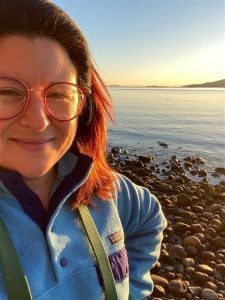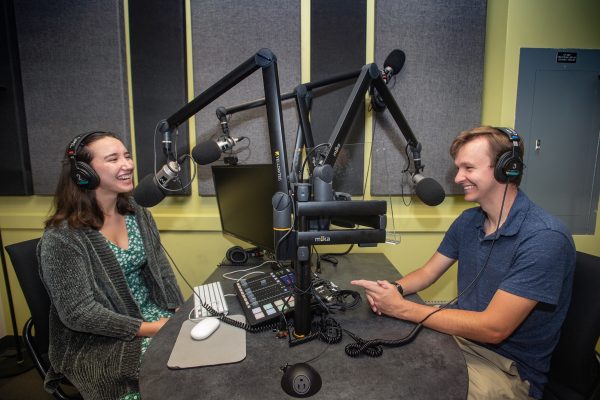In an audio recording, the sound of falling rain plays softly in the background while a woman shares a painful story about flooding in her southeast Austin neighborhood. She recalls in detail a storm on Halloween in 2013 when she watched the water rise to her porch. The streets turned into a river, overturning a car on her front lawn. It is a moving account of loss and uncertainty. But for some Austin residents, it’s also a story about climate change.
Aurora Berry, a third-year journalism student at The University of Texas at Austin, recorded the woman, Kathy Pilmore, for a new environmental podcast that she’s producing with recent Moody College of Communication graduate Will Brooks. They want to explore climate change from the perspective of those experiencing the most severe effects firsthand.
The pair met Pilmore, who is the president of the Onion Creek Homeowners Association, in her office in May. As she talked, she traced maps of the area’s floodplain with her finger and flipped through pictures on her phone showing the neighborhood’s continual flooding, which residents feel has gotten worse over the years because of climate change.
“Audio can be a powerful form of storytelling,” Berry says of the interview, which was their first in person since the pandemic. “There is something really special about having people tell their stories in their own words and hearing their voices.”
Berry and Brooks are part of The Drag, an award-winning, student-run production house at UT Austin. They are working on a new podcast that will feature expertise and interviews with UT researchers as the two journalists explore topics related to climate change through stand-alone episodes that examine different facets of the global problem.
So far, the student duo has come up with ideas for six episodes. One looks at ongoing recovery efforts after the 2011 Bastrop County Complex Fire — the most destructive in the state’s history — and another visits some unlikely renewable energy supporters across Texas who have decided to make the switch.
“It’s such an important story to tell because everyone is affected by climate change in some way or another, and they might not even know it,” says Katey Psencik Outka, journalism lecturer and senior producer for The Drag. “We have a lot of students in the journalism school who are interested in environmental reporting, and this is giving them the opportunity to explore new topics they haven’t had a chance to delve into.”
The Drag made its splash into the audio world in 2019 with the true-crime podcast The Orange Tree, which rose to the top 20 in all categories on Apple Podcasts. It’s the brainchild of Robert Quigley, the School of Journalism and Media’s innovation director, who wanted to give students an opportunity to use their reporting, writing and broadcast skills to create something big that could have a lasting effect.
Its newest series is a shift for the production house because for the first time, it is collaborating with UT researchers. Those researchers are part of a UT grand challenge called Planet Texas 2050, which aims to better prepare the state for the effects of rapid population growth and climate change. The podcast will be funded in part through the initiative’s Artist in Residence Program, which pairs researchers with artists to explore new ways of engaging people in urgent and difficult climate change conversations.
Though the podcast is funded by Planet Texas 2050, the work will be entirely student-driven.
“This is their project,” Psencik Outka says. “We want them to feel passionate about the stories they want to tell.”
Planet Texas 2050 researchers, including architects, computer scientists, geologists and humanities scholars, will act as advisers on the science behind climate change to ensure accuracy in the reporting, but they aren’t choosing the stories or controlling the narrative.
Jennifer Nelson Gray, a grand challenge research development officer and Planet Texas 2050’s former program director, hopes, however, that the podcast will allow them to talk about their research in a way that is relatable and understandable.
“It is important for us in this research grand challenge to work with the storytellers and people on the ground who are part of making the changes in our society,” she says.
From Crime to Climate

The idea for the new series started as a mere conversation.
Nelson Gray, who is an avid podcast listener, said she had become a huge fan of The Drag after voraciously consuming episodes of The Orange Tree, which tells the story of the 2005 murder of 21-year-old Jennifer Cave.
“The way the two students who produced it interacted with their interviewees was so sensitive,” she recalls. “It was clear that they were trained as journalists. They meticulously and impartially researched the crime and tracked down information from archives, which made the story riveting, but when they spoke with family members of the murder victim, they were very respectful and nuanced in their interactions. That really blew me away, and I think that’s fundamental in good storytelling.”
Nelson Gray wondered, what if we could tell climate change stories this way?
“Our hope is this collaboration will help diverse audiences engage more deeply on the subject beyond just thinking of it as a dire weather report,” she says of the research team’s decision to award money to the production house. “The Drag is incredibly successful, and millions of people around the world have heard their podcasts, so they have a built-in audience that our work could benefit from.”
Producing a podcast can be pretty expensive, Psencik Outka says. So having funding upfront through the artist in residence grant helps.
“It was what we needed to get this project off the ground,” she says.
Out of the Lab and on the Scene
Brooks and Berry were chosen from several reporters who applied for the project. Both previously worked in The Daily Texan’s audio department. Brooks, who hails from Atlanta, found his calling in journalism after calculus courses turned him off business school. Berry, raised in Bastrop County, got her start in storytelling by recording the daily announcements at her high school, earning her the title of “the news girl.”
“I didn’t think of myself as someone who would have been reporting on science,” she says laughing. “When I actually got this job, I thought, ‘Is this a dream?’”
The pair were given a broad theme to start with: cover whatever you like within the great state of Texas as long as it relates to weather, climate and population growth.
They decided to start locally in Austin’s Onion Creek neighborhood, listening to people’s stories about flooding and how it has affected their community. But their work this summer will take them all over the state, from West Texas to the Gulf of Mexico.
“We want to get out of the laboratories and into the places where people are living, working and raising their kids, using engaging sounds and scene-driven stories,” Brooks says. “Hopefully, people who hear this podcast even for a second might see themselves in these stories and say to themselves, I hadn’t thought how climate change is affecting me.”
Brooks and Berry say they don’t want the stories to be all doom and gloom though. They want to share hopeful accounts of researchers, local governments and community organizations working to prevent disasters, not just scrambling from one climate emergency to the next.
The goal is to have the research and reporting completed by August and to seek additional funding to produce the podcast, aiming to have it air sometime in the spring of 2022.
They have already conducted several interviews with Planet Texas 2050 researchers who have helped them understand topics such as the difference between weather and climate — one which can be felt daily and the other that occurs over a long period of time — and how rising average temperatures can result in more extreme weather events.
“Journalism is all about learning, too,” Brooks says. “You can’t tell people about something you don’t understand yourself. We are fortunate we have the Planet Texas 2050 researchers to help us out. Very rarely are you in a situation where you have so many experts who are so willing to offer their knowledge.”
Both Berry and Brooks acknowledge that beliefs about climate change vary widely in Texas — from advocates pushing for green energy initiatives to people who doubt the causes or severity of climate change or worry the focus on it is politically motivated. It’s important to include all these voices in the podcast, they say, because while not everyone might be on board with the science, everyone will be affected. And all people — from climate activists to people who may be less engaged — are a part of the democratic fabric of our country and will be making the decisions about how we respond to this unfolding crisis.
“We want to make sure that we are telling the story with empathy and in a way that humanizes people who may otherwise have big differences,” Berry says. “We all live on the same planet. We are all in this together.”
And senior producer Psencik Outka is hopeful that this kind of campus collaboration will set the stage for future storytelling opportunities as well. “We are forging a new path.”
To learn about The Drag and listen to podcasts, visit its website. And for more information about Planet Texas 2050, check out its site.




